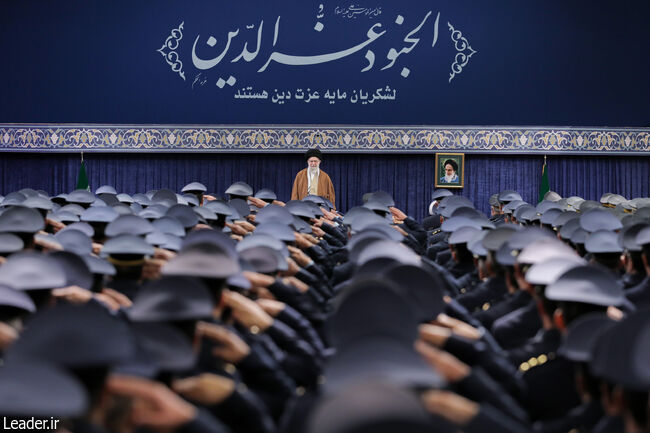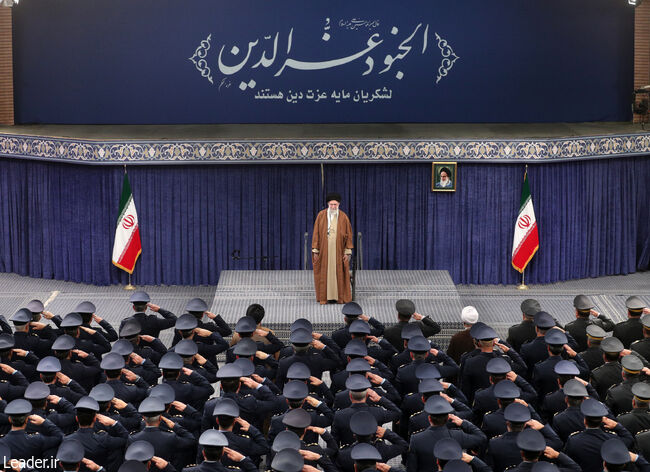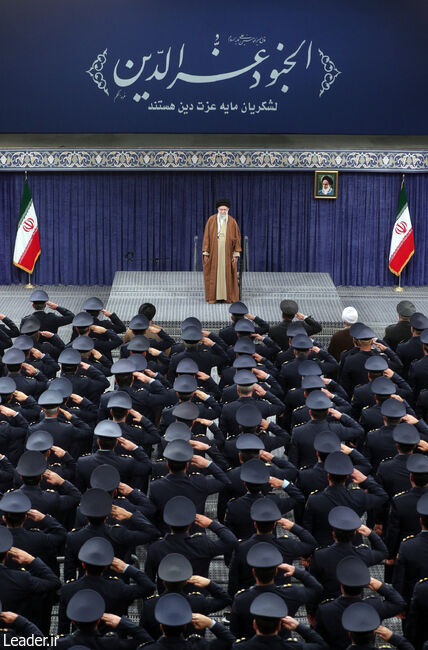This morning, on the anniversary of the historic pledge of allegiance by Air Force personnel and civilian staff to Imam Khomeini on February 8 (19th Bahman), 1979, the Commander-in-Chief met with a group of commanders and personnel of the Air Force and Air Defence of the Islamic Republic of Iran Armed Forces.
At the meeting, the Leader of the Islamic Revolution described the historic day of the 19th Bahman (February 8th) as the birth of a proud, independent military with an identity. He spoke about the fruitless experience of approximately two years of negotiations with the United States in the 2010s and the U.S. later reneging on all its commitments; he said, "Negotiations with the United States does not solve any problem, including economic and subsistence issues, just as they did not solve them in the past." Therefore, the solution to problems lies in the determination of committed officials and the solidarity of a united nation," which, God willing, we will witness on the 22nd Bahman (February 10th)."
Referring to discussions and debates about negotiations in newspapers, cyberspace, and in statements by some individuals, Ayatollah Khamenei said, "The focus of these remarks is negotiations with the U.S., and they speak of negotiations as if it is inherently good—implying that anyone who opposes it opposes the very idea of negotiation itself."
Noting the Foreign Ministry's active engagement in negotiations, visits, and agreements with countries worldwide, he said, "The only exception in this regard is the United States. Of course, we do not even mention the Zionist regime, which is an exception because it is not a state at all but rather a criminal gang and a land occupier."
Ayatollah Khamenei explained why the U.S. is an exception in negotiations. He said, "Some people pretend that just sitting at the negotiation table will solve certain problems, but we must understand correctly that the reality is that negotiations with the U.S. have no effect on resolving the country's issues."
The Leader of the Revolution cited the negative experience of the 1990s and the nearly two years of negotiations with the U.S. and several other countries that resulted in the nuclear agreement as proof of the futility of negotiating with the U.S. He said, "The government at the time sat with them, engaged in meetings and talks, smiled, shook hands, and fostered friendly relations, leading to an agreement in which the Iranian side, with great generosity, made numerous concessions. However, the Americans did not uphold their commitments to the agreement."
He pointed to the remarks of the current U.S. President about tearing up the JCPOA (Joint Comprehensive Plan of Action). He noted, "Even before him, the previous U.S. administration, which had accepted the agreement, did not adhere to it. The U.S. sanctions that were supposed to be lifted were not lifted, and the issue of the United Nations remained like a bone stuck in a wound, always looming over Iran as a threat."
Ayatollah Khamenei emphasised the necessity of learning from the experience of two years of negotiations, granting concessions, and making compromises without achieving results. He said, "The U.S. violated the very agreement itself, despite its flaws, and withdrew from it. Therefore, negotiating with such a government is neither rational, wise, nor honourable, and should not be pursued."
Speaking about the domestic and subsistence challenges that most people face, he said, "What resolves these problems is the internal factor: the efforts of dedicated officials and the unity of the nation. The manifestation of this national unity is the 22nd Bahman march, which, God willing, will once again showcase this solidarity to all."
The Leader of the Revolution cited a 'perceptive nation and tireless officials' as the key to solving problems. He added, "Thankfully, officials are actively working, and we are very hopeful that this honourable government will be able to alleviate people's subsistence difficulties and overcome hardships."
He referred to American efforts to reshape the world map, "Their actions have no reality and exist only on paper," he said, "Of course, they also express opinions about us, speak against us, and issue threats."
The Leader of the Islamic Revolution declared, "If they threaten us, we will threaten them in return. If they act on their threats, we will act on ours. And if they violate the security of our nation, we will, without hesitation, violate their security as well."
He said that this reciprocal approach has been derived from the Quran and the teachings of Islam, stating, "We hope that Almighty God grants us success in fulfilling our duties."
In the first part of his speech, he called the 19th of Bahman 1979 a blessed and glorious memory, saying, "The heroic action of those young men defined the course of the new armed forces and inspired various personnel and ranks within the military to join the ranks of the nation."
The Leader of the Revolution honoured renowned martyrs such as Sayyad Shirazi, Sattari, Babaei, Kalantari, and Fallahi. He said, "The fundamental factor behind the rise of these heroes was the same courageous action taken by a group of Air Force personnel and civilian staff three days before the victory of the Revolution amid great danger."
He described the key characteristics of the 19th Bahman 1979 movement as essential for the nation today, saying that courage and timeliness were the two outstanding qualities that described the action of the Air Force personnel.
Ayatollah Khamenei emphasised the importance of timeliness and making decisions at the right moment, adding, "The Tawwabun did not come to help Imam Hussein (a.s.) on the day of Ashura, but they rose in rebellion later and were all killed. However, their action was futile because it was not timely."
He described rationality and action based on careful calculation as another key feature of the 19th of Bahman 1979. He said, "Some people assume that revolutionary action is opposed to rationality, but in reality, revolutionary action requires calculation and wisdom more than any other form of movement."
The Leader of the Revolution mentioned that taking advantage of the enemy's negligence was another outstanding characteristic of the actions taken by the Air Force personnel. He said, "Counterintelligence agencies and army commanders failed to detect or even anticipate this movement, especially within the Air Force and, in truth, they were hit from where they least expected."
Ayatollah Khamenei spoke about how the Pahlavi regime subordinated the armed forces to the U.S. military apparatus. He said, "The army's organisation, weaponry, and training were American, and key appointments, as well as decisions on how to use the weapons, were made with American approval. The level of dependency was so extreme that Iranians were not even allowed to dismantle or repair military components."
He said that Imam Khomeini's speech in Aban 1343 (October 23 – November 21, 1964), which strongly opposed capitulation, was a protest against the disgraceful domination of the U.S. over the army and the country. He added, "According to the capitulation law, which all levels of the Pahlavi regime had accepted, no American, regardless of their crime, could be prosecuted in Iran."
He described the Sacred Defence as a stage where the capabilities of the transformed armed forces emerged and added, "Thousands of martyred army personnel shine like brilliant stars in Iran’s history."
Ayatollah Khamenei emphasised that defending Iran is a top priority and strengthening the armed forces is its most important duty. He added, "The army must be continually reinforced regarding manpower, weaponry, training, combat and defence readiness, addressing weaknesses and potential vulnerabilities, sustaining innovation, and developing new technologies. It must prove that it is capable of achieving even greater accomplishments."
At the beginning of the meeting, Brigadier General Hamid Vahedi, Commander of the Air Force of the Armed Forces of the Islamic Republic of Iran, presented a report on the force's activities over the past year. These included advancements in drone capabilities, the establishment of cyber defence operations centres, the command of an intelligence warfare room, conducting military exercises and competitions, and efforts to train a capable, motivated, and revolutionary cadre of personnel.



